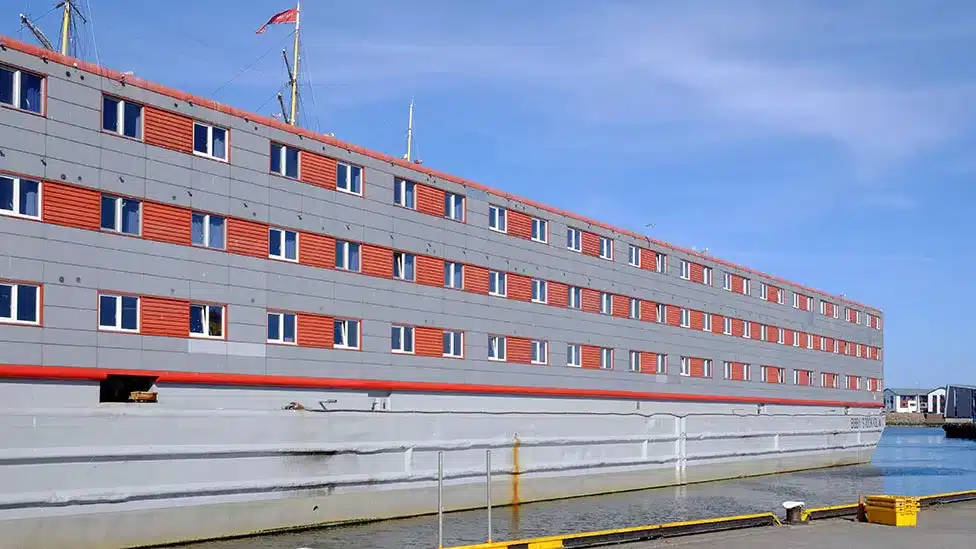By Nick Eardley & Oliver Slow
BBC News
Ministers are facing the prospect of a legal challenge if they go ahead with plans to house asylum seekers on a barge off the Dorset coast.
The Home Office is reportedly looking to use the Bibby Stockholm for the migrants to reduce reliance on hotels.
Portland Port said it had been selected to provide accommodation, but the government has not yet commented.
Local Conservative MP Richard Drax said “every action’s being looked at” to halt the plans, including a legal case.
The government says more than £6m a day is being spent on hotels for migrants. But charities say military bases and boats are “wholly inadequate places” to house people fleeing war and persecution.
The three-storey Bibby Stockholm – which has 222 rooms and can house more than 500 people – has been refurbished since it was criticised as an “oppressive environment” when the Dutch government used it for asylum seekers.
The vessel now has en-suite rooms, a TV and games room and a gym, according to a fact sheet from its owners, Bibby Maritime.
The UK-based company refused to confirm the deal to the BBC, but said it provides “practical, safe and comfortable” accommodation for a “wide range of clients across the globe”.
Environment Secretary Thérèse Coffey said the government’s priority is to convert disused military bases for use as migrant accommodation, but said it was “actively considering what can be done with some of these floating vessels”.
“But the priority is making sure we get those bases deployed first,” she said.
Details about any deal to use the Bibby Stockholm barge have not yet been confirmed, but a Home Office spokesperson said: “The pressure on the asylum system has continued to grow and requires us to look at a range of accommodation options which offer better value for money for taxpayers than hotels.”
The chief executive of Portland Port, Bill Reeves, said his site had “been selected by the Home Office to provide space for an accommodation facility,” adding that he was “liaising with the Home Office about the next steps”.
Mr Drax, whose constituency includes Portland, told the BBC he was “very concerned” about the impact on businesses in the area.
“We don’t have the reception centres that should have been built” to house asylum seekers, he said.
The area is “very sensitive” and relies on small businesses, Mr Drax said, adding: “If 800 or 900 people descend on us like this it’s going to have in my view an adverse effect on business.”
Dorset Council has also said it has “serious concerns about the suitability of the location for this facility.”
Speaking to the BBC’s Laura Kuenssberg on Sunday, Ms Braverman refused to confirm the deal, saying her office was “looking at all sorts of lands, sites and vessels”.
More than 51,000 asylum seekers are currently being housed in nearly 400 hotels around the UK.
As part of efforts to tackle the issue, last week Immigration Minister Robert Jenrick announced plans to use ex-military bases to house migrants.
He told the Commons that “the sheer number of small boats have overwhelmed the asylum system”, adding the government would “not elevate the wellbeing of illegal migrants above the British people”.
“Accommodation for migrants should meet essential living needs and nothing more, because we cannot risk becoming a magnet for the millions of people who are displaced and seeking better economic prospects,” he said.
The plans were criticised by Labour, with shadow home secretary Yvette Cooper saying the announcement was an “admission of failure”.
“They’ve got this huge backlog of asylum decisions, so much so that 98% of last year’s small boats arrivals simply haven’t even been decided or processed,” she said.

